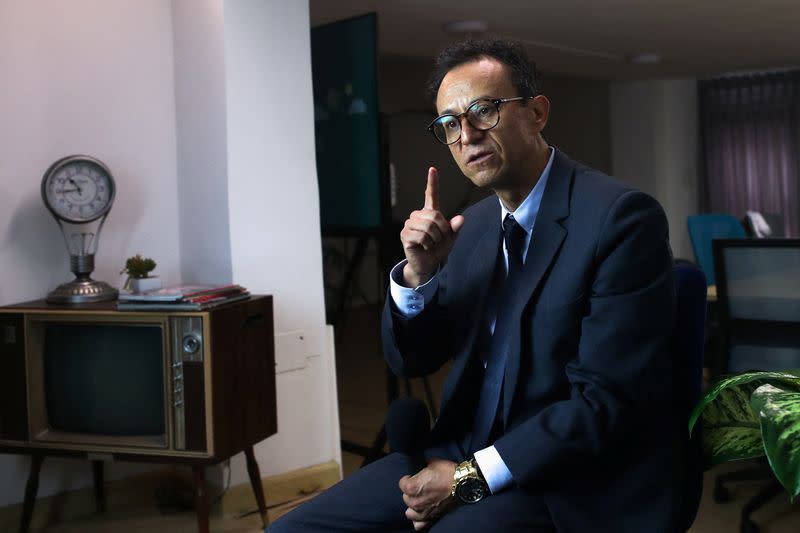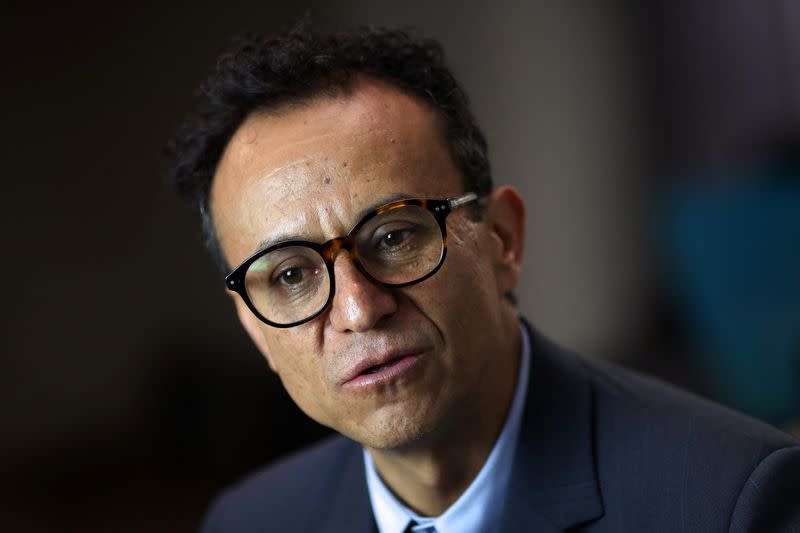Ecuador presidential hopeful Zurita promises better policing, social programs
By Alexandra Valencia
QUITO (Reuters) - Ecuador presidential hopeful Christian Zurita, who is running in place of his friend, slain candidate Fernando Villavicencio, said on Tuesday he would better equip the police and enshrine intelligence protocols to fight crime, and use international loans to shore up social programs.
Villavicencio was gunned down last week as he left a campaign event. His assassination left many voters weighing whether to participate in the Sunday ballot, as it drew attention to the sharp deterioration of security in Ecuador.
Like his predecessor, Zurita is an investigative journalist known for tracking alleged corruption.
The two men worked on 300 investigations together over the last decade, Zurita, 53, told Reuters in an interview on Tuesday.
"Until last Saturday I was a journalist," he said, adding Villavicencio would never have forgiven him if he allowed the campaign to die. "We do it for Fernando, we do it so his voice is not silenced."
Villavicencio's death must be thoroughly investigated, Zurita added, and given how much corruption Villavicencio exposed, the suspect list is long.
"They already killed Fernando. There's no need anymore for threats. If they killed him we know they are coming for us," said Zurita, who added he is unafraid. "The only way is to confront it."
The police must have the technology they need to properly combat crime, Zurita said, as well as a robust and well-regulated intelligence protocol for the security services.
"How do you fight something so big and powerful? There must be a series of consideration which first counts social issues. And second, puts the police in order."
Efforts could be funded by loans from other countries, Zurita said, and taxes should be reduced on businesses that hire young people.
"If there is no social investment and no work, (insecurity) will grow," Zurita said.
A new wave of migration stoked by unemployment has put the struggling economy at the forefront of concern for many voters.
The government must ensure small businesses can operate without fear of extortion and workers can choose how many hours they want to work, Zurita said, before it thinks about steps to attract foreign investment.
There will not be time during the truncated presidential period, which will last only until May 2025, for a new oil round or other major foreign investment efforts, he added.
"What we can think about are re-negotiations of (oil) contracts with existing companies," Zurita said.
The report Villavicencio made to the attorney general's office the day before his death was about a contract between state-run oil Petroecuador and top oilfield services firm SLB, formerly known as Schlumberger, Zurita said.
The production cost per barrel outlined in the contract favors the French company and is detrimental to Petroecuador, he said. SLB did not immediately respond to a request for comment.
Another party is contesting his candidacy, Zurita said, a roadblock that could prevent electoral authorities from approving him until Sunday, the day of the vote.
That blocks his chance of advertising, though the electoral council has said all votes for Villavicencio, who will appear on already-printed ballots, will be counted for his replacement.
"If they don't approve (the candidacy) it all will have been in vain," Zurita said.
The national electoral council said it had not yet received an objection to the candidacy.
Zurita has historically clashed with former President Rafael Correa, whose candidate Luisa Gonzalez has led polling.
Correa sued Zurita for moral injury over a book about his brother's business dealings and won a settlement, but later forgave the journalist. Zurita never paid the indemnity.
(Reporting by Alexandra Valencia in Quito, additional reporting by Gary McWilliams in Houston; Writing by Julia Symmes Cobb; Editing by David Gregorio)



